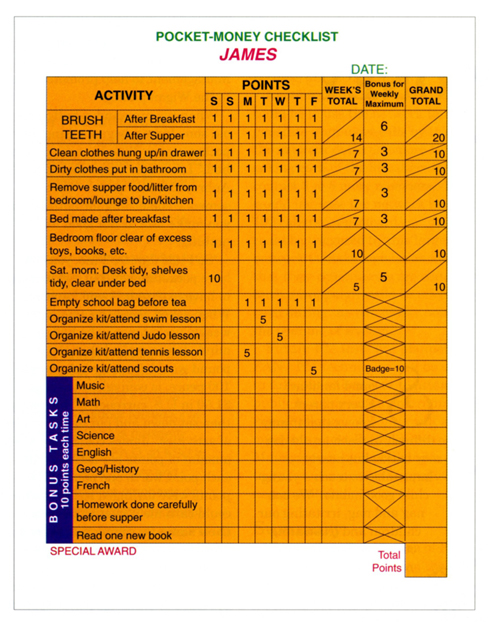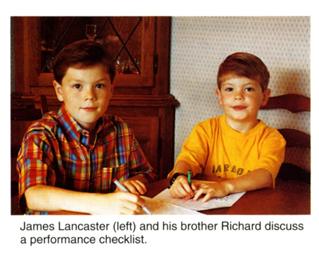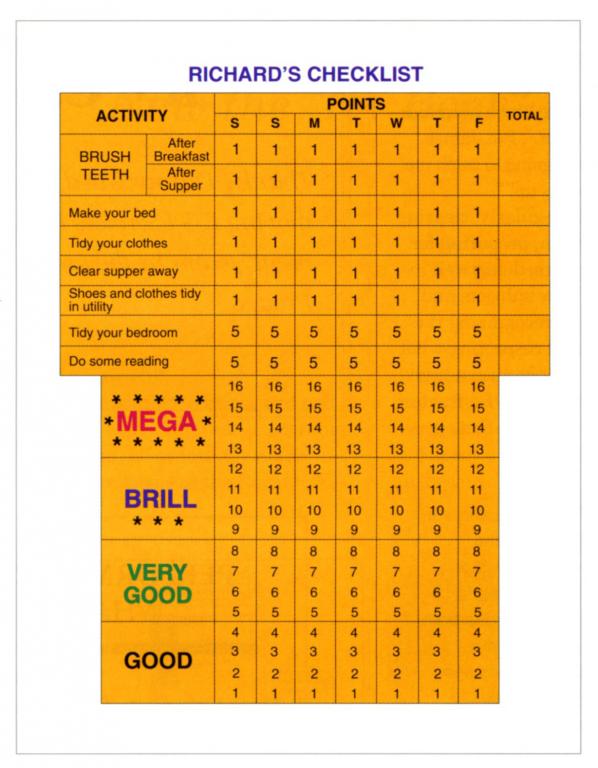The Pocket-Money Checklist
“No.”
“What about your room?”
“No.”
“I asked you to clean your room this morning and it’s 2:00 in the afternoon!”
Sound familiar? Every parent knows that it may be difficult to teach an old dog new tricks, but nearly impossible to teach a young child good habits. We can nag and nag, irritating our children and frustrating ourselves, but the outcome seldom changes our children's behavior. Brett Lancaster, of Parbold, England, father of two sons, is no different from other parents in that respect, with the exception that he learned about Performance Management (PM) through his association with PPG Industries in Wigan, England. Lancaster is a senior lecturer in management studies on long-term assignment as a training and development consultant with that organization. He completed advanced courses in PM to help promote its use in the Wigan plant.
 When his nine-and-a-half-year old son, James, began asking for pocket money "like his schoolmates had," Lancaster remembered an Aubrey Daniels quote: "Give someone something for nothing and you make him or her good for nothing." "So I told James, 'Fine, you can have pocket money, but you're going to have to earn it,"' said Lancaster. When asked about the amount of weekly pocket money he had in mind, James replied that about a pound would do nicely. (A pound, or 100 pence, is equivalent to roughly $1.50 in U.S. currency.) The family then sat down and put together a list of activities. James could earn a set amount of points per activity with each point worth one pence. The points were arranged so that James could earn his pocket money and then some for completing tasks and projects above and beyond daily requirements. Working together, the family came up with a fun and adaptable system. To his credit, Lancaster anticipated some possible hitches in the system before they occurred. "For example, with the brushing of the teeth I didn't want him to decide he only wanted to brush his teeth a few times a week, so I came up with the bonus points," Lancaster explained. If James earns the maximum-two points per day for brushing twice a day-he earns six extra bonus points. The pocket-money checklist also provides extra points for preparing for (putting his clothes and supplies together) and attending the extracurricular activities that James participates in, such as judo, swimming, and Boy Scouts. "He can't just get his kit organized and then after school say, 'I'd rather watch TV. He has to keep regular attendance to earn the five-point bonus," said Lancaster. (James can also receive a 10-point bonus for earning a scout badge.) Thinking ahead, Lancaster realized that though James doesn't have much homework now, in a few years he would likely have quite a bit. So he included a Bonus Task list. With this list, James can earn points for spending a minimum of 30 minutes on a project involving his school subjects. After the purchase of a home computer last Christmas, Lancaster also began rewarding points to James when he learned about various software programs. He can also earn extra points for special achievements at school. The whole system has resulted in some very positive changes. "James is very math dominant. He loves math. But in the last six to nine months, since he can earn points for drawing and coloring a picture, art has come way up for him," said Lancaster. "He never valued art as much as math and all of a sudden with only a small push, it just happened!" To date, James has never earned less than 100 points on his weekly score and often much more. The checklist has eliminated the nagging sessions as well as promoted good habits. "He now does the regular 'Activity' tasks on the checklist automatically," said Lancaster. When James first began using the checklist his father and mother spent time with him each and every night offering encouragement and praise. "Now, we just do spot checks. We occasionally go in and say, 'Let's have a look at your form. How are you getting on?' That's all we need to do because it's all filled out, all up-to-date," said Lancaster.
When his nine-and-a-half-year old son, James, began asking for pocket money "like his schoolmates had," Lancaster remembered an Aubrey Daniels quote: "Give someone something for nothing and you make him or her good for nothing." "So I told James, 'Fine, you can have pocket money, but you're going to have to earn it,"' said Lancaster. When asked about the amount of weekly pocket money he had in mind, James replied that about a pound would do nicely. (A pound, or 100 pence, is equivalent to roughly $1.50 in U.S. currency.) The family then sat down and put together a list of activities. James could earn a set amount of points per activity with each point worth one pence. The points were arranged so that James could earn his pocket money and then some for completing tasks and projects above and beyond daily requirements. Working together, the family came up with a fun and adaptable system. To his credit, Lancaster anticipated some possible hitches in the system before they occurred. "For example, with the brushing of the teeth I didn't want him to decide he only wanted to brush his teeth a few times a week, so I came up with the bonus points," Lancaster explained. If James earns the maximum-two points per day for brushing twice a day-he earns six extra bonus points. The pocket-money checklist also provides extra points for preparing for (putting his clothes and supplies together) and attending the extracurricular activities that James participates in, such as judo, swimming, and Boy Scouts. "He can't just get his kit organized and then after school say, 'I'd rather watch TV. He has to keep regular attendance to earn the five-point bonus," said Lancaster. (James can also receive a 10-point bonus for earning a scout badge.) Thinking ahead, Lancaster realized that though James doesn't have much homework now, in a few years he would likely have quite a bit. So he included a Bonus Task list. With this list, James can earn points for spending a minimum of 30 minutes on a project involving his school subjects. After the purchase of a home computer last Christmas, Lancaster also began rewarding points to James when he learned about various software programs. He can also earn extra points for special achievements at school. The whole system has resulted in some very positive changes. "James is very math dominant. He loves math. But in the last six to nine months, since he can earn points for drawing and coloring a picture, art has come way up for him," said Lancaster. "He never valued art as much as math and all of a sudden with only a small push, it just happened!" To date, James has never earned less than 100 points on his weekly score and often much more. The checklist has eliminated the nagging sessions as well as promoted good habits. "He now does the regular 'Activity' tasks on the checklist automatically," said Lancaster. When James first began using the checklist his father and mother spent time with him each and every night offering encouragement and praise. "Now, we just do spot checks. We occasionally go in and say, 'Let's have a look at your form. How are you getting on?' That's all we need to do because it's all filled out, all up-to-date," said Lancaster.
 Worried that the checklist might eventually grow stale for James, Lancaster added a monthly bonus. Now if James earns a minimum of 100 points every week for an entire month, he receives the bonus. Lancaster was careful that these bonuses didn't escalate in value. In other words, at James choice, the bonus could be having a friend stay overnight (no cost involved) or it could be an event involving costs, such as going to a movie or visiting an amusement park. The cost of the monthly bonus isn't an issue as long as the bonus is agreed on beforehand by all parties as a reasonable one. Of course, like most kids, James realized that a few items on his wish list were out of pocket-money range. He began asking Mom and Dad for more expensive items, such as computer games. Lancaster then set up a point system to help James learn the value of money through the experience of earning and saving for larger items. He now earns two pence for every point he earns above 100 points during the week. He also graphs the total number of points he earns during the month and at the end of the month receives two pence for every point (called the "Grand Doubling") to save and apply toward a larger reward (computer game). "Now he's got a yardstick of how much he can look for and anticipate in something he wants to purchase. He's quite happy with that," said Lancaster. And so is Lancaster.
Worried that the checklist might eventually grow stale for James, Lancaster added a monthly bonus. Now if James earns a minimum of 100 points every week for an entire month, he receives the bonus. Lancaster was careful that these bonuses didn't escalate in value. In other words, at James choice, the bonus could be having a friend stay overnight (no cost involved) or it could be an event involving costs, such as going to a movie or visiting an amusement park. The cost of the monthly bonus isn't an issue as long as the bonus is agreed on beforehand by all parties as a reasonable one. Of course, like most kids, James realized that a few items on his wish list were out of pocket-money range. He began asking Mom and Dad for more expensive items, such as computer games. Lancaster then set up a point system to help James learn the value of money through the experience of earning and saving for larger items. He now earns two pence for every point he earns above 100 points during the week. He also graphs the total number of points he earns during the month and at the end of the month receives two pence for every point (called the "Grand Doubling") to save and apply toward a larger reward (computer game). "Now he's got a yardstick of how much he can look for and anticipate in something he wants to purchase. He's quite happy with that," said Lancaster. And so is Lancaster. Several months ago Richard, James' six-year-old brother, asked for a checklist too. Lancaster designed a simplified version with points, praise, and stickers as the major reinforcers. "He's got no idea of money yet and just leaves it lying around the house when he's given it. But he wanted that checklist," Lancaster said. To help Richard with his math, his parents require that he color in a square when he completes a task, and then work out his own daily total. "We don't want it to be punishing so he starts out with a rating of good even if he only brushes his teeth," said Lancaster, pointing out the descriptive ratings that range from "Good" to "MEGA." "Richard loves those Megas"' Lancaster commented. Richard colors in one of four boxes daily, one for each week of the month that he earns a Mega rating. After earning four weeks of Megas, he earns a bonus treat. "For now, he's purely working on lots of feedback, encouragement, and praise. At the end of each week he also gets to choose a sticker. "I thought a six-year-old wouldn't keep this up for even a month, but he has!" said Lancaster. Recently, James teased his father about the pocket-money checklist. "Dad, you made a real bad move when you designed this form because I’m costing you a lot of money," he said. "I pretended to give him a hard-luck story," said Lancaster, but James said, 'No, you aren't going to catch me. I’m going to keep this up!'"
Several months ago Richard, James' six-year-old brother, asked for a checklist too. Lancaster designed a simplified version with points, praise, and stickers as the major reinforcers. "He's got no idea of money yet and just leaves it lying around the house when he's given it. But he wanted that checklist," Lancaster said. To help Richard with his math, his parents require that he color in a square when he completes a task, and then work out his own daily total. "We don't want it to be punishing so he starts out with a rating of good even if he only brushes his teeth," said Lancaster, pointing out the descriptive ratings that range from "Good" to "MEGA." "Richard loves those Megas"' Lancaster commented. Richard colors in one of four boxes daily, one for each week of the month that he earns a Mega rating. After earning four weeks of Megas, he earns a bonus treat. "For now, he's purely working on lots of feedback, encouragement, and praise. At the end of each week he also gets to choose a sticker. "I thought a six-year-old wouldn't keep this up for even a month, but he has!" said Lancaster. Recently, James teased his father about the pocket-money checklist. "Dad, you made a real bad move when you designed this form because I’m costing you a lot of money," he said. "I pretended to give him a hard-luck story," said Lancaster, but James said, 'No, you aren't going to catch me. I’m going to keep this up!'"


